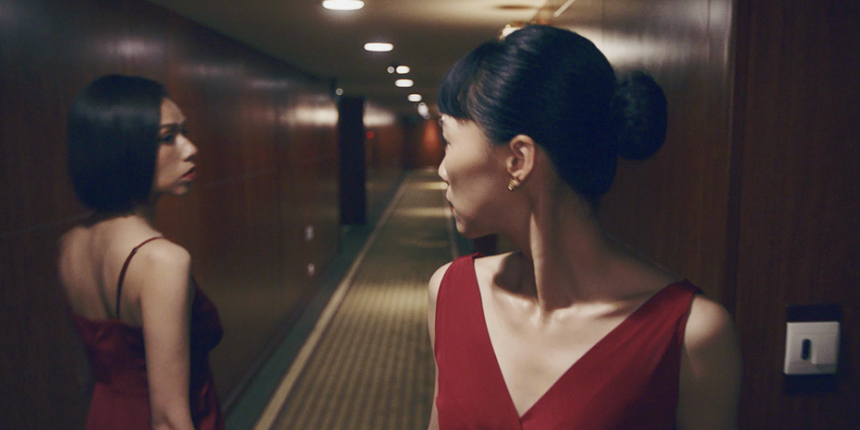Melbourne 2019 Review: NINA WU, A Clumsy #MeToo Psychological Drama

It would be a disservice to decent thrillers everywhere to give this Taiwanese Cannes entry the same genre label. It is a drama at best, and a very dour one that is devoid of any kind of spark, or thrill.
The eponymous Nina (Ke-Xi Wu, who also co-wrote the film) is a country girl who leaves the trappings of small-town theatre for the big city lights of Taipei. Struggling for years to secure a role beyond an extra in a short film or commercial, the audience is introduced to Nina in her squalid urban apartment making dumpling mix and preparing her routine streaming broadcast, where desperation pays off in the form of love credits.
When her agent contacts her out of the blue for a meaty role, she must swallow her pride and accept the fact the film, a cheesy period spy romance, has a full-frontal nudity scene. At this point alarm bells are ringing for the ordeal the industry might put Nina through, as well as her own grip on sanity and reality which is glimpsed through fragmented scenes of her rural life, ailing parents, her former lesbian romance she left behind, and the intense treatment the Director puts her through to deliver her lines.
Throughout the film Nina is presented with dumplings to eat, both on-set and in other places, and she quickly grows sick of them; does this mean anything? The film will not say. There is, of course, something else going on, which is hinted at in an obtuse manner throughout until the final few scenes that lay bare just why Nina’s mind is cracking, despite the films relative success.
This all sounds interesting, and there are certainly powerful themes and fascinating subject matter of how the industry operates to explore, but this is entirely squandered in its poor execution. Director Midi Z is a fascinating figure, responsible for social-conscious genre films that explore timely and taboo topics, such as the ice drug epidemic in Taiwan (Ice Poison, 2014) and Immigration crisis (The Road to Mandalay). Nina Wu is trying to say something about the #MeToo movement, the treatment of female actors and the abuse of power hierarchies, but it is just so dour, uninteresting and unfocused to leave any impact.
The script is basic and unfocused, and aspects of a broken psyche are depicted in such an amateurish way. Countless films have tackled this identity crisis and trauma; what is real and what is not, layers of psychological anguish that inform the films style and jarring aesthetic, all of which are absent in Nina Wu. Worse still the script delivers a cheap-shot with a twist that it almost immediately takes back. This is not clever and possibly even unintentional as there is no obvious recognition of this major plot element.
Before she even accepts the role, Nina is depicted as selfish and shallow and it is hard to feel much for her plight, unfortunately and given what transpires later. The one-note critique of the pursuit of fame, and the things that are expected; the lurid and soul-crushing experiences some actors endure for status or recognition is clumsily defined here and borderline offensive. This is exacerbated by the explanation of Nina’s father’s mental illness, which alludes to her current condition, like it is something that is contagious.
Good psychological thrillers have a film aesthetic that is informed by the inner turmoil of the protagonist, but this is sadly not the case with Nina Wu either. Aside from the impressive lighting and film-within-a-film perspective, the technical and atmospheric elements are flat and uninspired. Tonal inconsistencies also plague the film. Scenes presented out of order or in a dreamlike state are unconvincing and the most the film achieves is a grimy feeling of unpleasantness. Nina Wu cannot commit to taking the audience down a rabbit hole to truly understand the complexities of this traumatised actor. It starts to set interesting things in motion , but then moves on to something else.
Perfect Blue by the late Satoshi Kon is the film I kept thinking of when watching Nina Wu. Despite the fact the film is animation, it presents a cracking psychological thriller also set in the world of celebrity, and what transpires in that is far more believable, compelling and thrilling than anything Nina Wu achieves. Returning to the dumplings that Nina is sick of eating, that boil in a pot of water, unseasoned and overcooked. They are comparable to this dissapointing and muddled drama.







